Maranda Russell's Blog, page 105
July 11, 2012
Review of middle grade novel “Riley and the Kitchen Katastrophe”
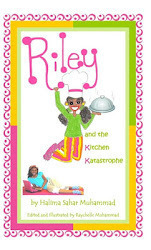 When I heard that a 12-year-old girl named Halima Sahar Muhammad was releasing her first middle grade novel, “Riley and the Kitchen Katastrophe”, I was eager to get the chance to read and review it. Partly, because I love to encourage young writers and partly because I was also 12-years-old when I wrote my first full-length chapter book (although I never did get it published).
When I heard that a 12-year-old girl named Halima Sahar Muhammad was releasing her first middle grade novel, “Riley and the Kitchen Katastrophe”, I was eager to get the chance to read and review it. Partly, because I love to encourage young writers and partly because I was also 12-years-old when I wrote my first full-length chapter book (although I never did get it published).
Anyhow, “Riley and the Kitchen Katastrophe” was a fun read. It’s not a particularly long read, at only 94 pages, so it won’t intimidate reluctant or struggling readers. Kids are sure to enjoy the humor in the story (especially the constant sibling banter between the main character, Riley, and her big brother, Atticus). Although it took awhile for the book to actually introduce the “kitchen katastrophe” part of the story, the plot is steady and comes to an expected, but satisfactory conclusion.
One of the things I liked best about this book is the author’s keen eye for detail. She obviously has a gift for description. In fact, many of her food scenes made me quite hungry! If Halima doesn’t grow up to be an author, I have the feeling she may grow up to be a chef, because she obviously knows ALOT about food and cooking for a girl her age!
Overall, my impression of this book is that it was a good first release, one that would be enjoyed by both girls and boys age 7-12 or so. I’m sure this young author has a very successful future ahead of her, regardless of what she chooses to do.
For more information on Halima Sahar Muhammad or “Riley and the Kitchen Katastrophe” (including ordering information), please visit the author’s website, http://www.halimasworld.blogspot.com/.








July 2, 2012
Some of the best books ever written were self-published
 It seems like there is a lot of condescension in the literary world about “self-published” authors. This annoys me. First off, because I have many friends who self-published excellent books, and secondly, because I have self-published two ebooks (even though my print books aren’t self-published).
It seems like there is a lot of condescension in the literary world about “self-published” authors. This annoys me. First off, because I have many friends who self-published excellent books, and secondly, because I have self-published two ebooks (even though my print books aren’t self-published).
So where does this bias come from? Is it because throughout history self-published books have been crappy? I highly doubt that. In fact, many of the best books ever written were self-published. Don’t believe me? Well, here is a short list of some self-pubbed classics:
*Beatrix Potter’s “The Tale of Peter Rabbit” was turned down by six publishers, but this didn’t get the young authoress down. She decided to self-publish the book. One of the publishers who had turned down the project saw the completed book, changed his mind and offered to publish the next edition of the book.
*Mark Twain, fed up with his previous publisher, decided to self-publish “Huck Finn”. Ironically it became one of his bestselling books, perhaps because he implemented a door-to-door marketing campaign.
*Edgar Allan Poe (my favorite writer of all time by the way), self-published his first book “Tamerlane and Other Poems”, thus effectively launching his career (even if he never did get the money or respect he deserved while alive).
*Charles Dickens self-published “A Christmas Carol” after having a fight with his publisher over the earnings related to a previous book.
*Some great authors like Jane Austen and the Bronte sisters even struggled to get publishers to publish their books ”all expenses paid”! In fact, Jane Austen’s family offered a publisher the opportunity to publish Jane’s first published novel, Sense and Sensibility, on ”behalf of the author who will incur all expenses”. Not only did Jane’s family pay for publishing costs, but they also had to pay a commission to the publisher for each book sold! Sounds like a rotten deal to me, but she did ok in the end.
*Ever read Tolstoy’s “War and Peace”? Neither have I, but it was self-published too.
*Even the manual that many writers use as their Bible was first self-published. Where would we be without William Strunk’s “The Elements of Style?”
*Some other authors who are said to have self-published at some point in their careers: Benjamin Franklin, Walt Whitman, e.e. Cummings, Carl Sandburg, Ezra Pound, Stephen Crane, Rudyard Kipling, Alexandre Dumas, Henry David Thoreau (plus many, many more, but I really don’t want to type all their names, so Google it if you are interested).
In the end, I’m not going to say that all self-published books are good, any more than I would say all traditionally published books are good, but I do think all books deserve to be judged for their literary merit, rather than their publisher.








June 19, 2012
Tips for teaching poetry writing to kids and teens
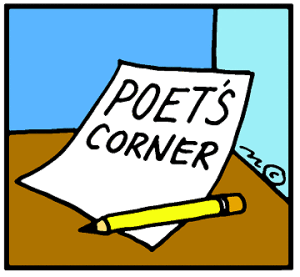 Along with all the author visits and book signings I do, I also spend some of my time teaching poetry and other writing forms to kids and teens. I often have teachers express to me how hard they find it to teach poetry (or any kind of writing) to the kids in their classroom, so I figured I would offer a few tips that I have found work for me when it comes to getting kids excited about writing in general and poetry in particular.
Along with all the author visits and book signings I do, I also spend some of my time teaching poetry and other writing forms to kids and teens. I often have teachers express to me how hard they find it to teach poetry (or any kind of writing) to the kids in their classroom, so I figured I would offer a few tips that I have found work for me when it comes to getting kids excited about writing in general and poetry in particular.
*First off, allow kids freedom with poetry writing, especially when they are first starting out. Free verse tends to be the most accessible and least intimidating form to begin with. If you try to force your students to rhyme or follow a form, you will quickly have a room of frustrated kids.
*Show your kids how much variety there really is in the poetry world. For many children their experience with poetry is limited to nursery rhymes and Dr. Suess. Make your classroom a poetry-friendly zone. Hang up posters with different kinds of poems on them, stock your bookshelves with an assortment of kid-friendly poetry books and make sure you include great examples of poetry in your curriculum throughout the year.
*Read your students poems that were written by kids their age. Before a child will feel confident that they can write poetry, they need to know that other kids their age have been successful with poetry writing and have even gotten published. A few great resources to find poems by kids and teens include the magazines Highlights for Children, Teen Ink and Stone Soup.
*Make it fun. Allow kids to play poetry games. One fun medium that has always seemed to be popular with kids and teens is magnetic poetry. If you have never played with magnetic poetry yourself, feel free to check out www.magneticpoetry.com to see what it is all about.
*Use prompts the kids will actually care about. The fastest way to lose your students’ interest is to give them boring, stuffy prompts. Don’t ask them to write an ode to spring or something predictable like that. Instead, ask them to write about bullies, pets, friends, dreams, things they love, things they hate, what makes them angry, etc. Just because kids are young doesn’t mean they don’t have feelings and emotions every bit as strong as adults do.
*Make your class a safe, constructive review zone. Encourage kids to share their poems with the class so that they can receive feedback, but make sure all the kids know that only kind, helpful comments are allowed. No teasing, jeering or laughing at a fellow student’s work (unless the poem is meant to be funny of course).
I hope you have found these tips to be useful. Feel free to let me know what works for you and what doesn’t. You can contact me at Shojobeatgirl@live.com if you have any comments or questions, or you can simply leave a comment below. Also, feel free to contact me if you are interested in having me visit your library, class or school!








June 12, 2012
Review of the Alice Parker’s Adventures fantasy series
Instead of just reviewing one book in this post, I have decided to go ahead and do short reviews of the first two books in the Alice Parker’s Adventures fantasy series. This new series, written by Nicola Palmer, is a fun foray into magic, adventure and mystery for middle grade readers and young adults. It is an original and interesting take on the whole “fairy” genre that is so popular with kids and teens right now. So without further ado…here are my reviews of the first two books.
 Book #1 - Alice Parker’s Metamorphosis
Book #1 - Alice Parker’s Metamorphosis
I have always loved the fantasy genre, but will admit to being picky about what series I will actually take the time to read. I look for books that are well-written, plausible (even fantasy needs to be believable) and most importantly, I want stories with characters that aren’t flat or boring. I am happy to say that Metamorphosis met and even surpassed my expectations.
From the moment I started reading this book, I actually found it rather hard to put down. The plot was engaging and carried enough suspense to keep me reading clear to the end, while the characters became almost like friends to me. I felt like I actually got to know Alice and her crew personally, which in my opinion is the ultimate aim of any fiction. I especially enjoyed the relationship between Alice and her brother, Thomas.
I don’t want to give too much of the plot away, but I will say that I was also very impressed with the author’s ability to create a new world that readers will want to call their own. This is a book that I can wholeheartedly recommend to kids and teens (or even adults if you like a good fantasy story).
 Book #2 – Alice Parker & the Mind Magician
Book #2 – Alice Parker & the Mind Magician
The second book in the Alice Parker series picks up a few months after the events of the first book, but the transition is done well enough that readers pick up on the storyline without skipping a beat. It quickly becomes apparent that the trials Alice is going to face in this sequel are even darker and more dangerous than the hurdles she overcame in the first book.
As the title suggests, much of this book’s battles are waged in the human mind, a very dangerous and disturbing scenario. Without getting preachy or slowing down the plot, this book manages to address some fairly sinister concepts, such as mind control and the corruption that often accompanies having too much power. I was wondering throughout the course of the book how the author was going to manage to bring the plot to a satisfying conclusion, but was pleasantly surprised to see that she managed to do just that.
After finishing the second book I was actually a little bit sad that it was over. I am definitely looking forward to the third book and hope that there will be many more volumes to come!
For more information on the Alice Parker’s Adventures series, please visit the author’s website, www.nicolapalmerwriter.blogspot.com.








May 24, 2012
“Bess the Book Bus” picture book review
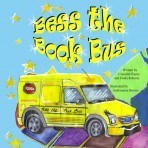 “Bess the Book Bus”, written by Concetta M. Payne and Freda Roberts is a book that I was excited to read before I even opened it to the first page. Some of my fondest childhood memories are of the library bookmobile that used to visit our school every week. “Bess the Book Bus” takes this great concept and goes even further with it.
“Bess the Book Bus”, written by Concetta M. Payne and Freda Roberts is a book that I was excited to read before I even opened it to the first page. Some of my fondest childhood memories are of the library bookmobile that used to visit our school every week. “Bess the Book Bus” takes this great concept and goes even further with it.
Like the bookmobile that many of us are familiar with, Bess is a real-life bus that delivers books and joy to children. However, Bess is unique as well. For one thing, Bess was created by a woman named Jennifer E. Frances. Jennifer named Bess after her late grandmother, Bess O’Keefe, who taught Jennifer how much fun reading could be.
Another characteristic that sets Bess apart from the traditional bookmobile is the the children who visit Bess actually get to keep the book they pick out! I don’t know about you, but that would have made my day when I was a kid! Free books would still put a big smile on my face today! Reading this book made me wish that every town had their own version of “Bess the Book Bus”.
As for the story itself, it is told in a charming, personal manner that kids will find easy to relate to. Bess is personified during the story, making her more accessible and exciting to kids. You feel like you really get to know her. The illustrations that accompany the text, which were done by Andrieanna Barnes, are colorful and visually appealing, with a hand-drawn flair to them. I feel that is is also important to emphasize that a portion of the proceeds received from the sales of this book go to support Jennifer Frances’ cause so that Bess can continue to deliver books to children.
I would definitely recommend this book for any school or library system and also think it would make a great gift for any child ages 3-9. For more information about this book and how to order it, please visit the “Bess the Book Bus” page on MagicBlox, http://magicblox.com/books/bess-book-bus.








May 22, 2012
Cursing and sexual terms – ok in literature for young adults?
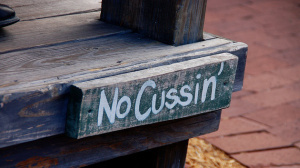 Lately, as I have been working with my editor to get my first book for young adults ready for publication, I have been thinking a lot about what is ok and isn’t ok to put in young adult literature. My new YA book is a poetry collection, and while it certainly isn’t riddled with sexual stuff or bad language, there is one poem where I use the word “damn” and one where I use the word “sperm”.
Lately, as I have been working with my editor to get my first book for young adults ready for publication, I have been thinking a lot about what is ok and isn’t ok to put in young adult literature. My new YA book is a poetry collection, and while it certainly isn’t riddled with sexual stuff or bad language, there is one poem where I use the word “damn” and one where I use the word “sperm”.
Now, I want to state up front I am not really a bad girl. I have never been one to turn to bad language, especially since I am around kids all the time and believe in setting a good example. In the poem where I used the word “damn”, I just felt that any lesser of an expression would look weak and stupid. The mood of that particular poem is serious and heartfelt, with the person speaking coming from a place of desperation. Saying “darn” just wouldn’t be honest to the depth of the feelings represented.
As for the use of the word “sperm”, it isn’t even really used in a sexual way, but more in a technical way. As in, the thing that eventually becomes a human baby is a sperm. Surely, no one could balk at that, right? But a part of me wonders. I know some parents and teachers can be so conservative and protective of their kids that they run from any sign of impropriety. Plus, many kids that aren’t even in the young adult age bracket still read young adult books. I know 10 and 11 year olds that have read “The Hunger Games”, which I’m sure is geared for an older audience.
I know this quandary of mine might seem ridiculous. After all, in a world where many young adult books are laced with the “f-bomb”, gruesome violence and descriptive sex scenes, why in the world would I worry about something like “damn” or “sperm”? I guess it’s just because I always tend to worry about what parents and teachers think. Maybe too much. Of course, it could be that I am just nervous because this is my first foray into the young adult literature world.
So what do you guys think? How much is too much in young adult literature? And how young is too young to read young adult literature?








May 13, 2012
School Author Visit Tales – Kids Say the Funniest Things
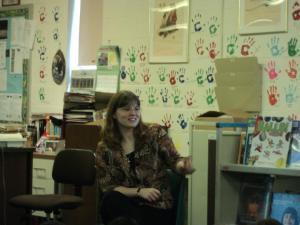 This past friday I had the pleasure to spend another day presenting my recent picture book, “Ode to Icky” during a school author visit. Although I love all aspects of the writing life – the brainstorming, the writing, the procrastination, the editing, the rush to meet deadlines, the re-editing, watching the book come to life with illustrations, holding the finished book in your hands – I think my favorite part of writing is doing book signings and author visits at elementary schools and other community centers.
This past friday I had the pleasure to spend another day presenting my recent picture book, “Ode to Icky” during a school author visit. Although I love all aspects of the writing life – the brainstorming, the writing, the procrastination, the editing, the rush to meet deadlines, the re-editing, watching the book come to life with illustrations, holding the finished book in your hands – I think my favorite part of writing is doing book signings and author visits at elementary schools and other community centers.
Why do I love these events even though they are tiring and sometimes extremely repetitive? Because of the kids! They are funny, sweet, creative and they treat me like I am famous (which is an awesome feeling, even if I know it isn’t true).
So I thought it would be fun to share some of the funny, weird and random things kids have said during one of my author visits. These aren’t all from one school or event, it is just a hodgepodge of what I have heard the past few months while I was out promoting my new book:
“Have you ever met Harry Potter in person?”
“How rich are you? Do you have a swimming pool and your own butler?”
“I really like your book but I think you are crazy for being a writer.”
“If your cat really stinks like the cat in Ode to Icky, then you should just hold his head under water for thirty minutes. He won’t stink anymore after that.” (I didn’t have the heart to tell this little girl that my cat would be dead if I did as she asked lol)
“Is your husband the illustrator of your book or is he just a plain old husband?”
“Can you autograph my sock?”
“You get into trouble a lot, don’t you?” (How did they know?)
“My cat is really ugly and she is going bald, do you want to borrow her so you can write another funny book about a cat?”
“Have you ever been arrested? If so, you might know my dad.” (I found out his dad was a police officer, which was a relief).
“My sister wants to be a writer, but she don’t got no talent.”








May 7, 2012
Author Anxiety
 You would think after you have your first book published and spend lots of time out in the public marketing it, that you wouldn’t be so nervous about future releases. Unfortunately, that just isn’t the case. At least, not for me.
You would think after you have your first book published and spend lots of time out in the public marketing it, that you wouldn’t be so nervous about future releases. Unfortunately, that just isn’t the case. At least, not for me.
Of course, I think part of the reason I am anxious right now is due to the nature of the current project I am working on. You see, my first published book was a picture book, but the book I am currently editing for publication is a poetry collection geared for young adults. There are several reasons that this particular project makes me nervous, so I figured that maybe if I put a name to these worries and move them out of the dark corner of my mind, perhaps they won’t have such power over me. So here they are, the anxious thoughts that have been haunting my dreams and my waking hours too:
The first worry is just that the book will be a big flop. Now this is a worry authors seem to have with every book they write, but I think the concern is greater with poetry books. Why? Because normally poetry just doesn’t sell. It’s sad but true. I do have a little glimmer of hope though since my book will be geared towards young adults, who actually do read books in verse, as long as they aren’t pretentious and boring.
Since this book is for young adults, that brings insecurities of its own. I’m used to reading my work to little kids who treat me like a superstar because I am an author. I’m not sure how teens will treat me. I guess my biggest fear is that they will roll their eyes, fall asleep or pronounce my work “lame”.
I know this may seem like a silly concern, but punctuation weighs heavily on me at times. Everyone seems to have their own opinion about the correct way to punctuate poetry. There are the grammar police who think you should punctuate poetry exactly like you would prose. Then there are the free spirited folks who don’t want to see much punctuation. Honestly, I don’t think that teens will care much about the punctuation, BUT their teachers might…and they are the ones I have to impress to book school visits.
Lastly, I am plagued by insecurity simply due to the vulnerability of poetry. Yes, as an author I do put a bit of myself into any book I write, but poetry takes that intimacy to an entirely different level. We put so much of ourselves into our poetry…fill it with our hopes, dreams, pains, struggles and our most private thoughts. If my poetry was rejected, I would honestly feel like I was rejected, because there is so much of myself contained within those verses.
You may be wondering by this point why I am even bothering to publish this book if I am so anxious about it. The fact is, regardless of how it turns out, I want to put myself out there. I want to be honest and real, expose the parts of myself that most people don’t see. Why? Because those are the kinds of books that have changed my life, and I want to do the same for the kids I come in contact with. I think the rewards will eventually outweigh the heartache…at least I hope they do.








April 26, 2012
“Japanese Folktales for Children” book review
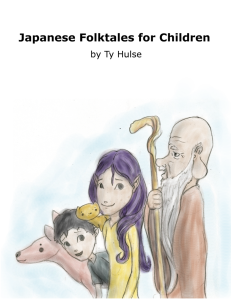 I’ve always been a fan of Japanese culture, particularly anime and manga, so when I was given the chance to review the new children’s book “Japanese Folktales for Children” by Ty Hulse, I was excited. Luckily, the book didn’t let me down. I found it to be a refreshing, fun look at traditional stories from a fascinating land.
I’ve always been a fan of Japanese culture, particularly anime and manga, so when I was given the chance to review the new children’s book “Japanese Folktales for Children” by Ty Hulse, I was excited. Luckily, the book didn’t let me down. I found it to be a refreshing, fun look at traditional stories from a fascinating land.
This storybook collection includes seven different tales from Japan, each unique both in its subject matter and in the delivery. I had already heard a couple of these stories before, such as ”Crane Feathers” and “The Yokai”, but even these stories were a little bit different from the versions I had previously read, so it was still an enlightening read.
One thing that I really liked about this book is that it was able to stay true to its Japanese origin without being too confusing for those who might not be familiar with the traditions and cultures represented. The stories are told in a clear, simple manner that makes them easy to follow, even if you have no idea what a Yokai or Kami might be (there is also a ‘Dictionary of Terms’ included in the book which explains the terms that may be confusing or new to you).
The illustrations that accompany the stories are simple, yet colorful. Although the stories would make sense without the pictures, the art adds a visual element that will help children to identify with the characters and plot of each folktale. The illustrations appear to be hand-drawn, which adds a touch of charm and almost gives off a folk art vibe, which is a great fit for the stories being told.
Overall, I really enjoyed this book and would recommend it to any family that likes fairy tale or folktale collections. This book would also be great for teachers who are trying to broaden their students’ cultural horizons.
For more information about this book, or to read a sample of the available stories, please visit http://zeluna.net/japanese-fairy-tales-children. It should also be noted that the Zeluna website features an extensive collection of fairy tales and folktales from all over the world, some of which can be pretty much impossible to find anywhere else, so make sure you check those out as well!








April 17, 2012
Book Review of “The Adoptive & Foster Parent Guide”
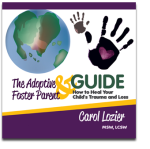 Although I normally only review children’s books, I do occasionally make an exception for a book that I can really relate to, and I can definitely relate to “The Adoptive & Foster Parent Guide” written by Carol Lozier, MSW.LCSW.
Although I normally only review children’s books, I do occasionally make an exception for a book that I can really relate to, and I can definitely relate to “The Adoptive & Foster Parent Guide” written by Carol Lozier, MSW.LCSW.
As a foster/potential adoptive parent myself, I can say that far too many resources written about the subject of adoption and foster care are clinical and boring. I have read many of these books in hopes of finding some useful, practical information about the issues I face daily working with troubled kids, but have often been disappointed. However, “The Adoptive & Foster Parent Guide” did not disappoint in any way, in fact, I found it to be one of the best resources out there.
So what makes the book so great? First off, it is accessible and easy to use. As the introduction explains, the book is formatted with a magazine style that makes it easy for busy, stressed-out parents to browse through when they want a little inspiration or need information on a particular subject. I did read the book cover to cover, but there are parts of the book I marked and highlighted that I know I will likely return to again and again.
Secondly, the book is filled with advice and knowledge that real people can relate to while they are in the trenches fighting to help the traumatized children who have come into their lives. The part of the book on the various attachment styles was excellent, in fact, I wish it was required reading for every person who obtains a foster or adoption license. Far too many well-meaning people go into foster care and adoption with no real understanding of attachment issues. Without this crucial knowledge, it is nearly impossible to help traumatized children or create a healthy home life for the entire family.
Lastly, the book addresses issues that cause many foster or adoptive parents to burn out or even give up. Self-care is sometimes entirely left out of the equation when parents try to solve problems, but the truth is that if you don’t take good care of yourself, you won’t be able to care for others in a healthy way. If you continue to neglect your own physical, emotional and mental health, you are bound to add to the problems you and your family are facing instead of solving them.
Overall, this is a great book, one that I would whole-heartedly recommend to anyone who works with troubled children or wishes to do so. For more information about the book or to order a copy, please visit www.forever-families.com.











